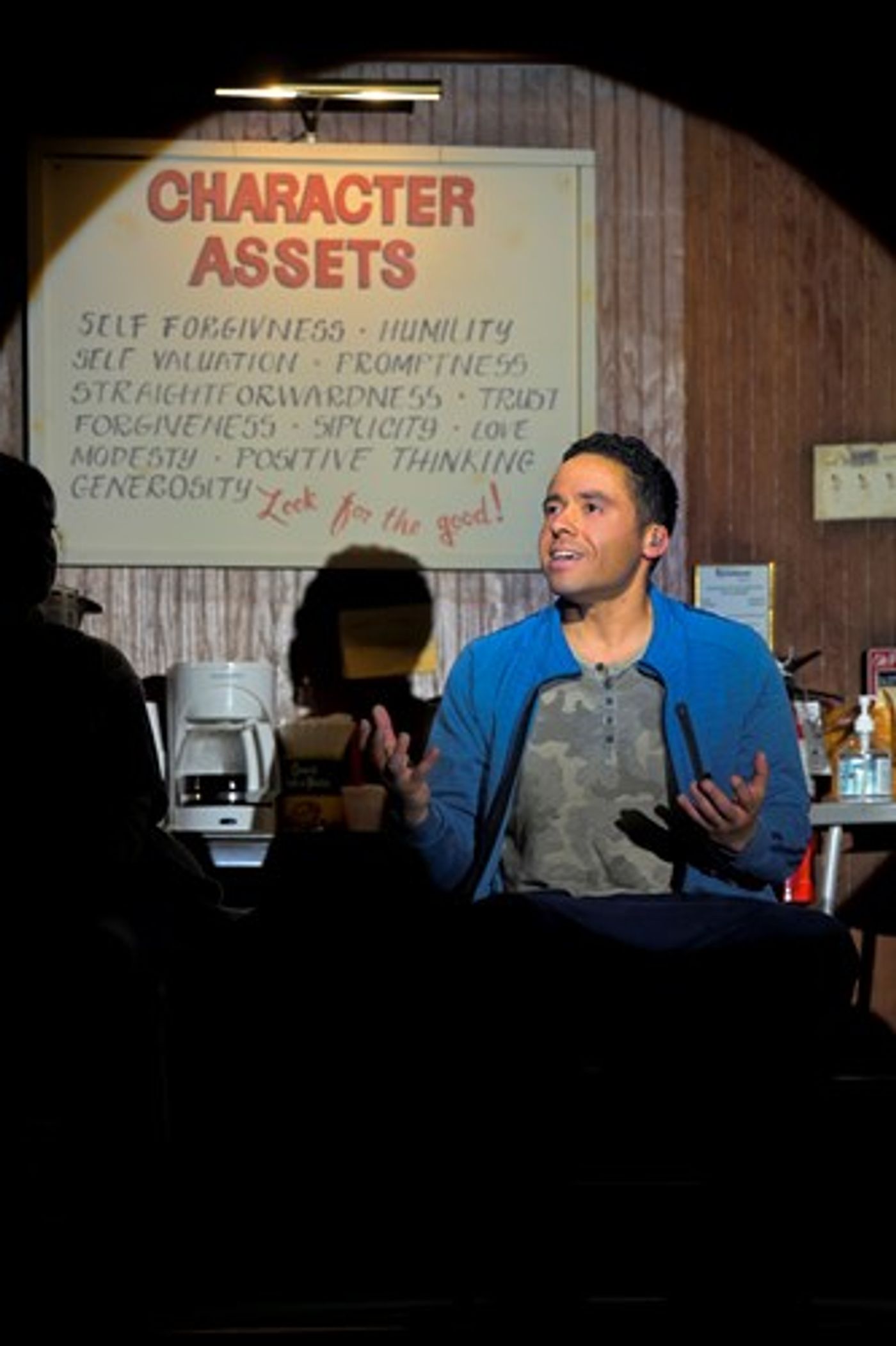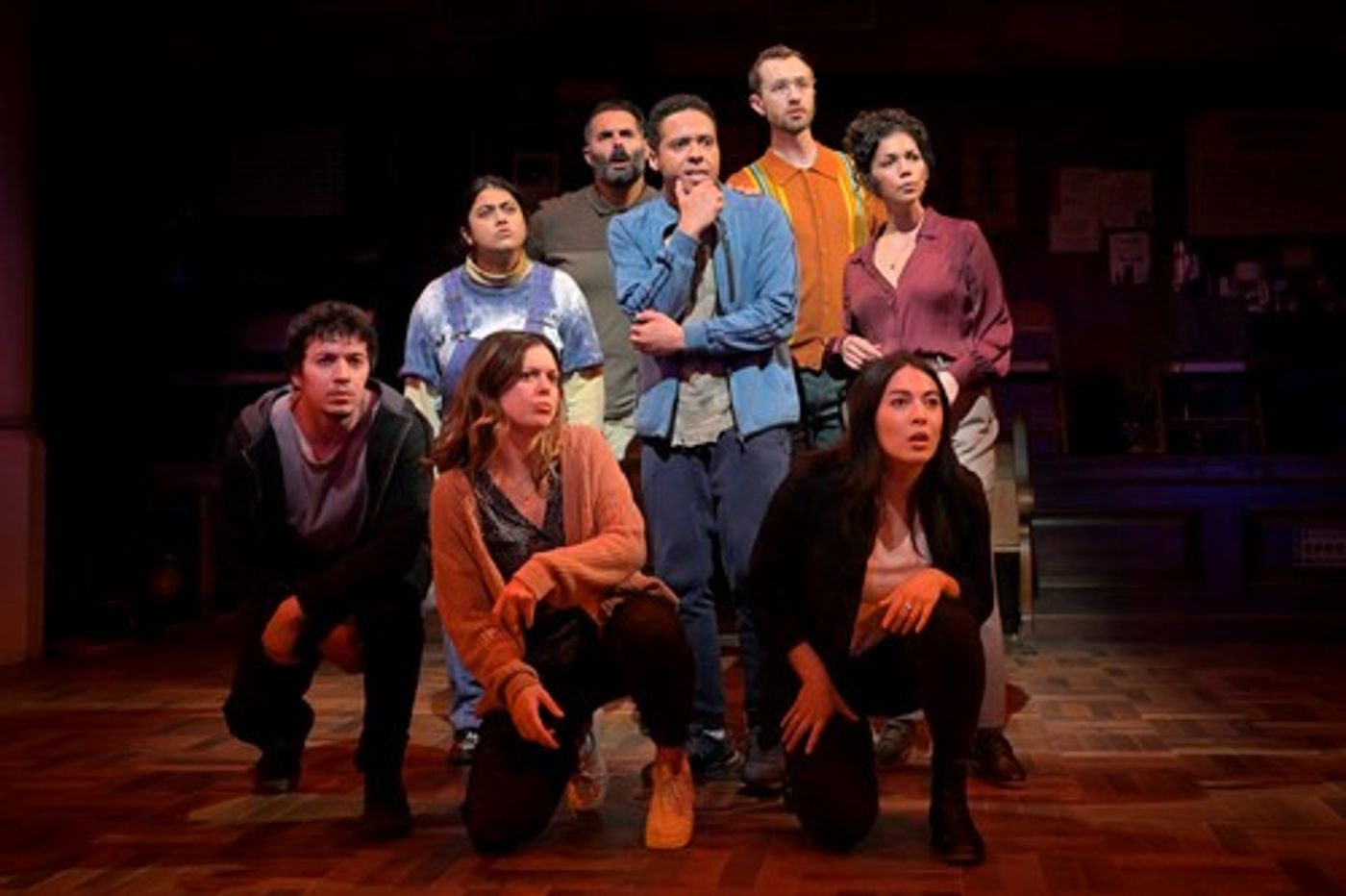Review: OCTET at Berkeley Rep Finds the Humanity in Our Technology-Obsessed Culture
Dave Malloy's beguiling acapella musical runs through May 29th

Isabel Santiago, Justin Gregory Lopez & Kim Blanck in Octet at Berkeley Rep
Octet is one of the most bracingly original new musicals I've seen in ages, and one that speaks directly to the times we're currently living in. It could be succinctly described as an acapella musical about the deleterious effects of screen technology, which it most definitely is, but it is really about a lot more than that. It ultimately paints a portrait of the lostness so many of us feel as we grapple to connect with each other. And after two years of COVID, who can't relate to that? Although the show was written pre-pandemic, it now feels more relevant than ever.
As the sole writer of the music, lyrics, book and vocal arrangements, Dave Malloy has concocted a fascinating work that feels at once slightly alien and oh-so-familiar. Watching it is not unlike the experience of, say, seeing a group photo you're in and thinking "Do we really look like that?" Um, yes, I'm pretty sure we do. Malloy's conceit drops us into a meeting of the "Friends of Saul," a sort of 12-step program (er, make that an 8-step program) for screen addicts. Like most such groups, this one meets in what appears to be the basement of a church and draws a variety of rather lost souls seeking to overcome their addictions. As the group assembles, Paula, the interim facilitator filling in for an absent Saul, announces the order of business, which will include time for individual sharing interspersed with "hymns," something she rather off-handedly refers to as "Fugue State," and the "Tower Tea Ceremony." And for the next 100 minutes, that is exactly what we get.

Through the individual shares, we meet some instantly recognizable characters, such as Jessica, who is dealing with the blowback she's gotten from a recent rant of hers that was surreptitiously captured on video and went viral. Karly and Ed are trying to navigate the confusing and perhaps treacherous waters of the online dating scene. We also get to know Henry, a Candy Crush addict who is so over-eager to share and appears perpetually uncomfortable in his own skin. (Take a ride on MUNI or BART during rush hour and you're likely to encounter similar Candy Crush enthusiasts.) And then there's Marvin, a committed atheist, who still trolls the internet for "scientific proof" that God exists. While they add up to a sort of community of displaced individuals, Malloy doesn't take an entirely dim view of the role of technology in their lives, as there is also Velma who marvels at her ability to connect with a young girl halfway around the world.
While I'm not convinced the overall arc of the show entirely works, it does have several things going for it that make it extraordinarily compelling. First, it is a wholly original musical, not in any way based on an existing work know so we can't anticipate where it's going. Second, it literally gives primacy to human voice, as the only sounds we hear are human-produced, other than a recurrent pitch pipe which begins each number. And third, it explores existential issues of connection, dislocation and spirituality that we all grapple with in our everyday lives. I can't remember the last time I saw a musical that held up such a close mirror to the world we actually live in.
It also helps enormously that Octet gets a pitch-perfect (sorry!) production at Berkeley Rep. Amy Rubin and Brittany Vasta's set would require an entire review of its own to do full justice to its on-the-money level of detail. It calls to mind every multipurpose room in every church in America, with its faux-parquet flooring, pool-table green carpet, undersized pale pastel "stained glass" windows, worn folding chairs of two slightly different vintages and overhead fluorescent lighting. It felt so authentic I could practically smell the Hawaiian Punch that I was sure was being doled out by some unseen church ladies in an adjacent room. And even though it's a unit set, Christopher Bowser's ingenious lighting eventually shows it has a lot of tricks up its sleeve as we visit a variety of locations, some imaginary and some not. Brenda Abbandandolo's costumes are equally adroit. One of the hardest challenges for a costumer can be to design unshowy, contemporary streetwear that gives us information about the characters, and Abbandandolo nails it. As just one example, Paula's understated, silky burgundy blouse and fawn slacks instantly mark her as the facilitator of the group.
Annie Tippe's sensitive direction is absolutely spot-on, never calling attention to itself. This is truly an ensemble show, so a single false move by anyone can throw the whole thing off balance, and that never happens here. Everyone in the cast is a capable actor and vocalist, knowing just how far to take their big solos without showboating or losing their sense of character, and then deftly receding back into the group as they provide background vocals for the next number. In a uniformly excellent cast of 8, I have to give a special shout-out to Isabel Santiago as facilitator Paula, with her perfect balance of welcoming good cheer and ever-so-slightly unnerving chilliness. Alex Gibson is also a total delight as Henry, the introvert who just cannot wait for his chance to share, and dances with such gleeful abandon even as he seems uncomfortable in his own body. This is not to slight the other actors, all wonderful, who for the record are Adam Bashian, Kim Blanck, Justin Gregory Lopez, J.D. Mollison, Margo Seibert and Kuhoo Verma.

Isabel Santiago, Kim Blanck & Margo Seibert in Octet at Berkeley Rep
All eight actors are responsible for producing the thing that ultimately brought me the most pleasure, which is the pure sound of the human voice. It is such a rare thing in today's over-amped world that when an actor moves onstage, their voice moves with them. What a joy it was, in the intimate confines of the Peet's Theatre, to hear the sound of their harmonies reaching my ears with only the barest hint of amplification. And those harmonies were perfection - intricate and juicy, layered above a deep foundation provided by the resonant bass voices of Bashian and Gibson. There is an intimate connection that can occur only when sound leaves an actor's throat and enters an audience member's solar plexus, creating its own vibration there, human to human. As much as I have enjoyed some of the virtual theater I've experienced over the past two years, this simple, unmediated transmission of vibration from actor to audience is the single thing I have missed the most. It can only happen when we're all sharing the same space, the same air, and Octet delivers it in spades.
(all photos by Kevin Berne/Berkeley Repertory Theatre)
Octet runs through Sunday May 29th at Berkeley Repertory Theatre, 2015 Addison St., Berkeley, CA. Running time is approximately 100 minutes, no intermission. For tickets and additional information, visit www.berkeleyrep.org or call 510-647-2949.
Reader Reviews
Videos

